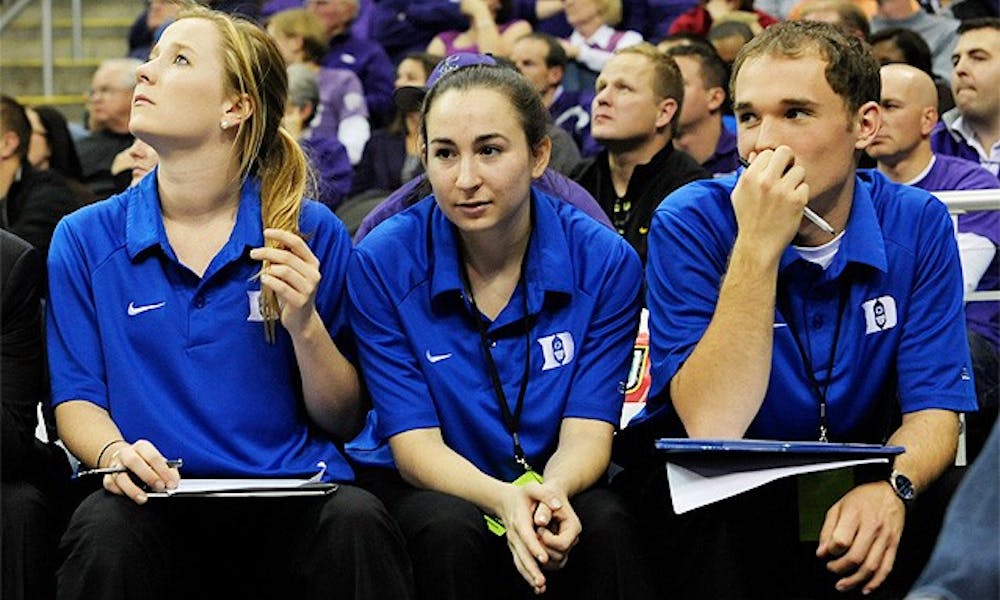Senior Pat Thompson sometimes arrives at his job by 6:45 a.m. and on other nights can stay as late as 2 a.m.
His work is far from glorious—he and his nine fellow managers are responsible for mopping sweat off the floor, filling water coolers and editing film, among other tasks. For all this, the salary is exactly zero dollars.
Still, this year, like every year, more than 100 eager underclassmen applied for as few as three positions as a manager for the men’s basketball team.
“They get a great, great learning experience that will benefit them as they become professionals in a few short years,” Director of Basketball Operations Chris Spatola said. “To me, there is no extracurricular activity at Duke that will prepare them more for life after Duke than being a manager.”
Although there are other obvious perks to serving as a manager, with the main one being the inherent proximity to the basketball program, it is the desire for experience and a jump start in the professional world that motivates most to sign up. Other benefits include the scholarship that the senior managers share.
For many managers, the natural step after graduation is staying within basketball. Brian DeStefano served as a manager through his graduation in 2005, and then as a graduate assistant afterwards. Since 2007 he has been an assistant coach at Harvard for head coach Tommy Amaker, who was a player and assistant coach at Duke.
“I knew that I wanted to coach at some level coming out of high school,” said DeStefano, who credits much of his coaching career to the Duke connection he developed with Amaker. “For him, knowing that I had worked as a manager for Coach Krzyzewski, it certainly helps me in terms of his familiarity with me.”
DeStefano is not the only manager who has stayed within basketball, but others have moved on from the college game to the professional leagues. Brett Greenberg Trinity ’08 worked for a year with the Miami Heat, and is now in his second year as an assistant video coordinator with the Washington Wizards.
Chris Lauten, a manager from 2003 to 2008, also works in professional basketball as Coordinator of Basketball Operations for the NBA Development League, the NBA’s minor league system. In this role he is able to exercise many of the skills that he learned as a part of the Duke basketball program, such as scouting and film processing.
“My real focus and interest is in player personnel. It’s something I’ve always loved,” he said. “Had I not been a manager at Duke, I would not have had the experience or training to do what I am doing now.”
Lauten’s work with Duke basketball players didn’t stop after he graduated from the school. He assisted guard DeMarcus Nelson, who was in the league during Lauten’s first year, and Lauten said it felt like a “victory” when Nelson made it to the NBA. The former manager now works with Lance Thomas, who is currently in the D-League as a member of the Austin Toros.
On the other side of the spectrum, many ex-managers have moved on from basketball and are utilizing their skills in other lines of work. At least two have moved on to Goldman Sachs. One of those is Ashok Varadhan who made partner at age 29 and reportedly earned over $10 million in 2009. The other is Griffin Tormey, who feels that his experience in Duke Basketball’s pressure-cooker environment prepared him for the hectic world of finance.
“There are definitely similarities between the two [jobs] in terms of pace, attention to detail and culture,” Tormey said. “Goldman, more than most, is more of an attention to detail oriented culture.”
Others have taken their experience to pursue less conventional careers, such as Joey McMahon who started the charity Miracle Mondays, which provides children’s hospitals with activities to uplift the patients’ spirits. He has been able to tap back into the Duke Basketball network for help and he says Nolan Smith, Casey Peters and Miles Plumlee have been “a huge help” to the charity.
While many managers have had illustrious careers, the graduates did go through the downsides of the program. The major detraction for being a manager is the time commitment. Excluding travel time—the managers go on all road trips with the team—they spend upwards of 35 hours per week carrying out various tasks during the season.
“[It was] definitely [limiting socially], but there are tradeoffs in everything in life,” Tormey said. “You don’t have that extra 30-40 hours a week for social activities.”
Serving as a manager also prevents the students from spending a semester abroad. Nonetheless, people rarely drop out of the program, and when it occurs it is usually for academic reasons, Spatola said.
“Anytime those thoughts crept up in my mind, I would pause, look around, and try not to get caught up in the day or week, but think about the program, my experience and game days,” Lauten said. “There is no better feeling than being in Cameron Indoor Stadium.”
Get The Chronicle straight to your inbox
Signup for our weekly newsletter. Cancel at any time.

